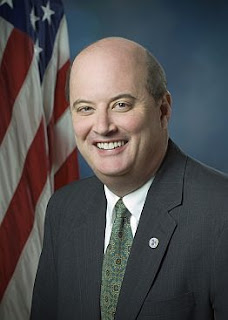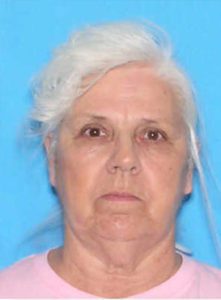The 81-year-old David Black Daugherty
pleaded guilty Friday May 13, 2017 in federal court in Lexington to two counts of
taking illegal gratuities. Daugherty agreed to pay the government
$609,000 as part of his plea.
(Above, see Judge David Black Daugherty)
But Judge Daugherty worked for Frank Cristaudo, who was the Chief Administrative Law Judge. (CALJ).
(Above, see SSA CALJ Frank Cristaudo)
They both worked for Social Security Commissioner Michael Astrue.
(Above, see SSA Commissioner Michael Astrue)
Judge Daugherty was working to eliminate the "back log".
The Chief Administrative Law Judge had and has day-to-day oversight of all of SSA's's hearing operations.
Judge Cristaudo testified before Congress that he wanted to implement a comprehensive plan to eliminate the backlog of hearings. By eliminating the backlog, he would improve hearing office productivity and the timeliness of SSA hearings and decisions.
Judges like ALJ Dave Daugherty were at the heart of his operation. He testified that he would be monitoring the workloads of these Judges and their cases carefully.
He had selected a number of excellent judges including Judge Daugherty. He needed more judges like Judge Daugherty who were well-suited to SSA's type of work - judges who were capable of thriving under the workload demands of SSA's high-volume, electronic hearing operation. Judge Daugherty was the most prolific high producer that he had.
After successfully eliminating SSA's 1,000 or more day-old cases in FY 2007, he focused on reducing the 900 or more day-old cases by the end of FY 2008. He testified that he believed a backlog of aged cases interfered with the normal hearing office workflow. Productivity was up because of Judge Daugherty and others who decided cases without holding Hearings. The new judges were trained by the highest-producing judges in SSA's ALJ corps, judges like Judge Dave Daugherty.
The complete text of Chief Judge Frank Cristaudo's testimony can be read at:
(See https://www.ssa.gov/legislation/testimony_091608.html)
Wasteful and fraudulent disability payments are well-documented
problems, but a congressional probe has found that they often result
when administrative law judges (ALJ) in the federal bureaucracy approve
previously rejected claims.(Above, see Judge David Black Daugherty)
But Judge Daugherty worked for Frank Cristaudo, who was the Chief Administrative Law Judge. (CALJ).
(Above, see SSA CALJ Frank Cristaudo)
They both worked for Social Security Commissioner Michael Astrue.
(Above, see SSA Commissioner Michael Astrue)
Judge Daugherty was working to eliminate the "back log".
The Chief Administrative Law Judge had and has day-to-day oversight of all of SSA's's hearing operations.
Judge Cristaudo testified before Congress that he wanted to implement a comprehensive plan to eliminate the backlog of hearings. By eliminating the backlog, he would improve hearing office productivity and the timeliness of SSA hearings and decisions.
Judges like ALJ Dave Daugherty were at the heart of his operation. He testified that he would be monitoring the workloads of these Judges and their cases carefully.
He had selected a number of excellent judges including Judge Daugherty. He needed more judges like Judge Daugherty who were well-suited to SSA's type of work - judges who were capable of thriving under the workload demands of SSA's high-volume, electronic hearing operation. Judge Daugherty was the most prolific high producer that he had.
After successfully eliminating SSA's 1,000 or more day-old cases in FY 2007, he focused on reducing the 900 or more day-old cases by the end of FY 2008. He testified that he believed a backlog of aged cases interfered with the normal hearing office workflow. Productivity was up because of Judge Daugherty and others who decided cases without holding Hearings. The new judges were trained by the highest-producing judges in SSA's ALJ corps, judges like Judge Dave Daugherty.
The complete text of Chief Judge Frank Cristaudo's testimony can be read at:
(See https://www.ssa.gov/legislation/testimony_091608.html)
The Social Security Administration (SSA) discovered deficiencies in appeals decisions from every ALJ it has reviewed since 2011, according to a report by the House Committee on Oversight and Government Reform.
All 48 of the individual reviews found the ALJs wrongly evaluated applicants’ ability to work and discounted drug addiction or alcoholism, among other missteps.
Congressional investigators built on a June 2014 report that conducted three case studies of ALJs who "rubber-stamped" almost every appeal they evaluated. By granting disability benefits to just 100 people who aren’t actually disabled, the trio added $30 million to the federal budget.
The 1,400 judges who handled disability appeals handed out benefits to more than 3.2 million people between 2005 and 2013, granting the requests of more than half of all applicants at a cost of nearly $1 trillion.
What’s more, investigators discovered 191 judges had approved 85 percent or more of the appealed applications that came across their desks.
The only way SSA gauged the performance of the judges was by adding up the number of cases a judge oversaw in a given time period, according to May 2013 testimony by Frank Cristaudo, a former chief administrative law judge.
Another top judge testified in October 2013 that granting more than 75 or 80 percent of appeals should raise a “red flag” about the reliability of those decisions.
But awarding benefits takes “significantly less time” than denying them, the report said.

The probe uncovered a 2012 internal review in which SSA found that the more cases judges had to decide, the less reliable their decisions were. That review found the overall accuracy of appeals decisions began to fall once judges ruled on 600 or more cases a year.
Even so, SSA allowed dozens of judges to decide more than 1,000 cases every year, the report said.
Without conducting any research into how long appeals decisions should actually take, Cristaudo enforced policies that compelled judges to process between 500 and 700 cases every year, the report said.
SSA allowed “overwhelming evidence of incompetence” among its judges to continue by focusing solely on pushing as many cases as possible through the system, regardless of whether they were handled correctly, the report concluded.
But Frank Cristaudo, was Chief Administrative Law Judge. (CALJ) when Judge Daugherty was working to eliminate the "back log".
The Chief Administrative Law Judge had and has day-to-day oversight of all of SSA's's hearing operation.
Judge Cristaudo testified before Congress that he wanted to implement a comprehensive plan to eliminate the backlog of hearings. By eliminating the backlog, he would improve hearing office productivity and the timeliness of SSA hearings and decisions.
Judges like ALJ Dave Daugherty were at the heart of his operation. He testified that he would be monitoring the workloads of these Judges and their cases carefully.
He had selected a number of excellent judges including Judge Daugherty. He needed more judges like Judge Daugherty who were well-suited to SSA's type of work - judges who were capable of thriving under the workload demands of SSA's high-volume, electronic hearing operation. Judge Daugherty was the most prolific high producer that he had.
After successfully eliminating SSA's 1,000 or more day-old cases in FY 2007, he focused on reducing the 900 or more day-old cases by the end of FY 2008. He testified that he believed a backlog of aged cases interfered with the normal hearing office workflow. Productivity was up because of Judge Daugherty and others who decided cases without holding Hearings. The new judges were trained by the highest-producing judges in SSA's ALJ corps, like Judge Dave Daugherty.
The complete text of Chief Judge Frank Cristaudo's testimony can be read at:
(See https://www.ssa.gov/legislation/testimony_091608.html)







